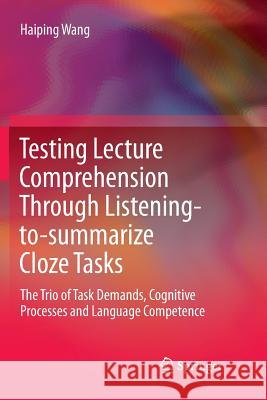Testing Lecture Comprehension Through Listening-To-Summarize Cloze Tasks: The Trio of Task Demands, Cognitive Processes and Language Competence » książka
topmenu
Testing Lecture Comprehension Through Listening-To-Summarize Cloze Tasks: The Trio of Task Demands, Cognitive Processes and Language Competence
ISBN-13: 9789811348242 / Angielski / Miękka / 2018 / 207 str.
Testing Lecture Comprehension Through Listening-To-Summarize Cloze Tasks: The Trio of Task Demands, Cognitive Processes and Language Competence
ISBN-13: 9789811348242 / Angielski / Miękka / 2018 / 207 str.
cena 402,53
(netto: 383,36 VAT: 5%)
Najniższa cena z 30 dni: 385,52
(netto: 383,36 VAT: 5%)
Najniższa cena z 30 dni: 385,52
Termin realizacji zamówienia:
ok. 16-18 dni roboczych.
ok. 16-18 dni roboczych.
Darmowa dostawa!
Kategorie:
Kategorie BISAC:
Wydawca:
Springer
Język:
Angielski
ISBN-13:
9789811348242
Rok wydania:
2018
Wydanie:
Softcover Repri
Ilość stron:
207
Waga:
0.32 kg
Wymiary:
23.39 x 15.6 x 1.19
Oprawa:
Miękka
Wolumenów:
01











